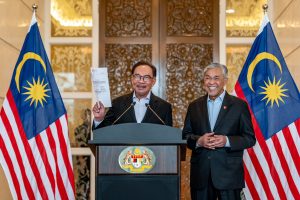Malaysia’s Prime Minister Anwar Ibrahim yesterday announced a minor cabinet reshuffle, amid growing public discontent around the state of the country’s economy.
Speaking during a televised press conference, Anwar, who also serves as finance minister, said that he would increase the size of the cabinet to 60 ministers and deputies, up from 55 previously, in order to prioritize his administration’s focus on the economy, health, and education.
Among the most significant appointments, a full list of which is available here, Anwar appointed Amir Hamzah Azizan, the former chief executive of the Employees’ Provident Fund, Malaysia’s largest pension fund, to support him as second finance minister.
“The ministry of finance, other than being headed by me, must have a strong professional team to ensure we are on the right track and focus on the economy,” Anwar said in the press conference, Reuters reported.
Anwar also moved Mohamad Hasan, the deputy president of his coalition partner, the United Malays National Organization (UMNO), from the Defense Ministry to the Foreign Ministry, while current Foreign Minister Zambry Abdul Kadir has been transferred to head the Ministry of Higher Education.
Anwar also shuffled Fadillah Yusof, one of his two deputy prime ministers, from the Ministry of Plantation and Commodities to a newly-created post: energy transition and public utilities minister. Veteran UMNO politician Johari Abdul Ghani was returned to cabinet to take on the former post, while Dr Dzulkefly Ahmad was named as health minister, after previously holding the post under Prime Minister Mahathir Mohamad from 2018 until 2020.
The reshuffle is an attempt to rejig and reinvigorate his sprawling unity government after a turbulent year in office. Anwar took office in November 2022 after an inconclusive general election in which no single coalition won a clear majority. Following five days of negotiations in which Anwar’s reformist Pakatan Harapan (PH) coalition, which won 82 parliamentary seats, duked it out with former Prime Minister Muhyiddin Yassin’s Perikatan Nasional bloc (74 seats), he eventually managed to form a unity government with several smaller rival parties, including the once dominant Barisan Nasional coalition and its dominant component UMNO, which he spent much of his career opposing.
As Sophie Lemière wrote last week for Washington’s Center for Strategic and Internationals Studies, the year since has been “a shaky one” for Anwar’s administration, which has been pressured by elections in six states and “ferocious” Malay nationalist opposition from the PN coalition.
The coalition government, founded on a “mismatch” between the PH and BN coalitions, Lemière wrote, had been “restricted by a lack of political cohesion, incessant politicking, and the coalition’s insecurities toward the growing discontent of the Malay majority and the disenchantment of non-Malay PH supporters.”
This was reflected in a public opinion survey published last month by the Merdeka Center, a local polling firm, which found that public support for Anwar’s government was ebbing due to growing public concern over the performance of Malaysia’s economy. The poll of 1,220 registered voters in late October found that Anwar’s approval rating had slipped to 50 percent, down from 68 percent in December 2022, the month after he took office. Meanwhile, about 60 percent of respondents said they felt Malaysia was moving in the “wrong direction.”
According to the Merdeka Center, “the movements in voter sentiments are largely driven by their concerns over the economy and how it affects their livelihoods.”
However, the task of firing up the economy is complicated by his desire to adopt a more conservative and restrained fiscal policy. Late last month, Malaysia’s House of Representatives approved a scaled back budget for 2024 that, as per Bloomberg, “seeks to narrow the budget deficit through a combination of subsidy cuts, new taxes, and lower debt payments.”
As Amalina Anuar noted last month in East Asia Forum, Anwar’s “commitment to more prudent fiscal management” is in a considerable degree of tension with Anwar’s need to win over Malay voters in order to ensure his political survival.
“The pressure to be consistent in reform policies and messaging, while also keeping a grip on popular political support and leverage, highlight the long road to fiscal consolidation,” she wrote.
Anwar’s reshuffle would seem to be an attempt to maximize the economic dividends for the Malaysian public, particularly the ethnic Malay majority, at a time of fiscal tightening. Whether or not this succeeds, however, the reshuffle has not addressed the fundamentally awkward constitution of the coalition that elevated Anwar to power – and of the powerful pro-Malay forces ready to pounce on any misstep by the current administration. While Malaysia’s prime minister has survived his first year in office mostly intact, he can expect to face a challenging few years between now and the next general election in 2027.

































